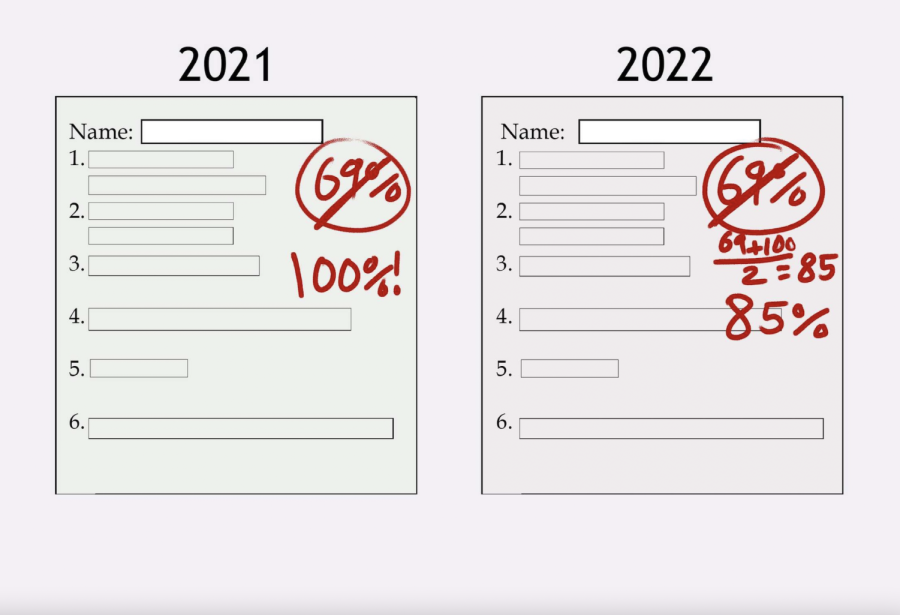The new test retake policy averages the two scores together, in change from before, where the new score would replace the old.
Head to Head: Is the new assessment retake policy fair for students?
March 3, 2022
As of the second semester, Midtown’s policy on retaking assessments has been revised. The new policy states that test retakes will be averaged with the original failing score, and that missed assessments are required to be taken within a week of the original assessment date. Comment Associate Managing Editor Katie Sigal and Co-Editor in Chief Ava Smith take sides on whether this new policy is a positive change for students.
Test retake policy change hinders students
Midtown has decided to change the school-wide test retake policy for the spring semester. Before the policy change, a new test grade would replace the failing one, allowing students to get a complete do-over. By putting these new and unnecessary restrictions on test retakes, Midtown isn’t eliminating cheating and is instead penalizing students who are trying to improve their grades.
By averaging the two scores, the school is ensuring that a student’s first attempt, no matter how bad, will hurt them, even if they show marked improvement. Now, the highest grade possible to get on a reassessment is an 85, and that’s only if a student scores the highest score eligible for a retake on the original test, which is a 69 and a 100 on the retake. This can discourage students from trying again by making them believe that retesting is a waste of time.
However, these second chances are extremely beneficial in adolescence, when students are still learning about the world. A study found that failing a test can actually succeed in helping students learn the right answer by trying and failing first. By allowing students to embrace and identify their mistakes, deeper, more meaningful learning will occur.
Most teachers require a tutorial session before the retake to allow students to ask questions, review and learn from their past mistakes. Studies show that after tutoring, students can significantly improve their scores. But this policy does not let students completely fix their mistakes, instead only letting them slightly improve their scores, even after all of their extra work at tutorial.
Failing one test can bring down your entire test average, ultimately bringing down your grade. Having a safety net previously provided by retakes was extremely beneficial for students, and didn’t harm their preparedness for college or real life. If anything, high school students shouldn’t be held to the same standards as college students or adults, yet this policy change insists on holding them to those impossibly high standards.
The reason for the change was most likely due to cheating. Some students would purposely fail the original test to get the answers and ace the retake with no penalties. While this was the case with some students, most genuinely didn’t do well on their first attempt and wanted to try again. These students want to be able to learn from their mistakes, but because of the new policy, they are being unfairly penalized due to the actions of others.
Though there was some cheating during retakes, not every student cheats. This new policy is unfair for the students who didn’t cheat and truly wanted to improve their grade and do better. This policy does not allow this crucial academic development to take place. The old policy must be reinstated in order to give those students a fighting chance in this new, virtual era of cheating and deception.

Katie Sigal is a senior and Comment Managing Editor and Social Media Editor for the Southerner. She is on the swim team and, in her free time, she likes...
New assessment policy prepares students for real world
Midtown’s assessment retake policy has been revised. According to the new policy, students can retake assessments, but their new score will be averaged with their original score. While this policy may not be popular among many students, it is more fair than the previous policy.
The previous retake policy was much less specific, which left much of the retake expectations up to individual teachers. This meant rules about retaking assessments were often different across classes, with some classes being more lenient than others. The new policy will allow test retakes to become more consistent, which will overall benefit the student population.
Some may believe this change penalizes students who want to improve their scores. However, this is not a penalty at all. The new policy still allows students the opportunity to retake their assessments and improve their scores. The difference between the new policy and those previous, is by combining scores, the new policy not only promotes learning from past mistakes but also necessitates that students take responsibility for their past mistakes. This is important because in most colleges and in the workplace, one cannot simply restart on a fresh slate if they make a mistake. The retake policy should reflect that high school students need to learn how to improve while still taking responsibility for past mistakes.
This policy will also likely improve students’ performances on the original assessments. Allowing complete do-overs does not incentivize students to study or take the assessments seriously the first time around because they know they can always completely re-do them. Previously, many students who did not think they would get the score they wanted on a test or quiz would intentionally fail the quiz so they could retake it and get their desired score. This new policy dissuades students from intentionally failing quizzes because that failing score will impact their final grade even if they do retake it. By mandating that the new score is combined with the original score, students will be incentivized to try their best on their first attempt.
Additionally, this new policy is more equitable because it mandates that teachers create a new assessment for retakes. This is important because previously, the assessments students retook could be identical to the original. This gave students who aced a retake with no penalties an unfair advantage over those who did well the first time around, since the students retaking the quiz would already know the questions. In this way, the new policy can help limit unfair advantages and cheating, which is increasingly problematic at Midtown. However, creating a new quiz or test is a tedious and time-intensive task for teachers who already have a lot on their plates; so, the threshold for them having to recreate tests should be high. By incentivizing students to do better on their first attempt and seriously prepare for a retake, this new policy makes it more worthwhile for teachers to regenerate new versions of assessments for retakes.
The standards this new policy sets are not impossibly high but rather a more accurate and productive reflection of the stakes students will be faced with in the real world. Just because this policy is more stringent and less popular does not mean it is a bad policy. In fact, the changes are much more effective in making assessment retakes a fairer and more constructive tool for students and teachers.
